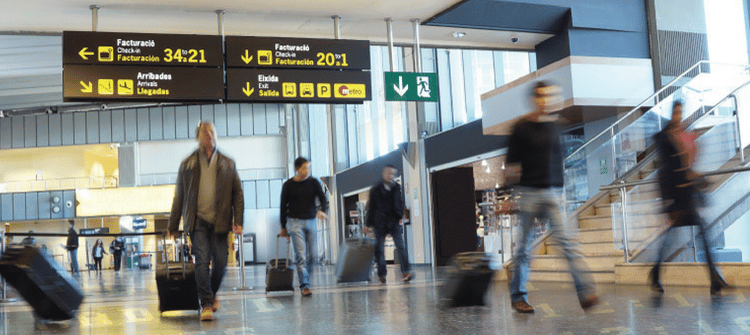Facing New Threats: Challenges and Risk in Today's Travel Industry - Pt. 1
Posted by Mike Atherton on 30 August, 2016

The global travel industry is fast approaching some of the largest obstacles it is likely to encounter: The high threat of terrorism; the rise of the sharing economy; the outbreak and rapid transmission of the Zika virus; the uncertainty of the global economy; the fall of oil prices and the fluctuation of world interest rates are just a selection of problems that are facing world travel companies today. And, for European TMCs specifically, the after-effects of Brexit are anything but certain. Due to the high number of risks facing the global travel, this post is the first of two covering this issue.
The Threat of Terrorism
Terrorism may now pose the single greatest threat to the travel industry. In recent times, foreign visitors have been shunning holiday destinations in the wake of terrorist attacks due to concerns over security, with hotel occupancy rates dramatically falling in areas that have been affected.
In France, hotels in Nice saw a rapid 45 per cent decline in revenue after the attacks in July 2016. In Paris, the latest statistics found that the hotel occupancy rate has halved; hotels within the French capital had an occupancy rate of only 32 per cent in the second half of July, compared to 77 per cent last year. This has been problematic for the French tourism industry – Paris was ranked the third most popular city destination for foreign visitors in 2015 with over 16m visitors, and tourism makes up more than 7% of the country's annual GDP.
Across the border in Belgium, the state of affairs is equally discouraging. Brussels lost an estimated €150 million in revenue after April’s terrorist attacks, as hotel bookings fell 25 per cent compared to the previous year. Further afield in Istanbul, it is a familiar story; back in 2015 the historical city placed in the world’s top-five fastest growing foreign travel destinations, but with an increase in terrorist activities, the number of foreign travellers visiting the city has greatly diminished and, with it, economic growth.
It is not just within Europe that terrorist attacks have had an impact; explosions in the tourist towns of Phuket and Hua Hin in Thailand could result in the country losing up to 200,000 tourists by the end of the year, according to the head of the tourism authority, Yuthasak Supasorn.
It is clear that the threat of terrorism is having an adverse effect on the numbers of tourists travelling to affected cities, however the number of corporate travellers is also negatively impacted, meaning that TMCs are also beginning to feel the strain. According to a YouGov survey, terror attacks have cost the travel industry $8.2 billion in travel spending alone, whilst travel operators such as Thomas Cook are set to miss profit targets having reported a loss in revenue.
In an attempt to cast some positive light over the issue, some travel analysts have declared that tourist destinations recover from terrorist attacks quicker than they would an environmental disaster. However, with the increasing regularity of attacks, on a scale never before seen, the long-term impacts are impossible to predict – ensuring that terrorism remains the number one threat to travel.
The Travel Industry’s Sharing Economy
The sharing economy refers to the collaborative consumption of goods and services using a peer-to-peer service. The appeal of this system is that it is often significantly cheaper than purchasing a similar product from a retailer or vendor. The rise of companies such as Airbnb, Uber and Lending Club are testament to the attraction of the sharing economy and, as such, it continues to prove a consequential threat to the global hospitality industry.
Some experts predict that the brand value of all top ten hotel chains – including the likes of Hilton, Marriott and Accor – are set to fall significantly this year, and this has been attributed to the rise of the sharing economy and specifically the encroachment of Airbnb. This is in spite of data that shows that less than 50% of Airbnb demand is coming at the expense of those traditional hotels. This, combined with the fact that only 7% of Airbnb users stay 1 night (vs 25% for traditional hotels), speaks to how Airbnb is primarily focused on non-hotel, leisure, longer-duration stays, rather than corporate single-night stay segments that are commonly affiliated with the major hotel chains mentioned above.
The predicted fall in brand value has not gone unnoticed however, and a fracture has formed between global hotel brands and online travel agencies (OTAs), who are more at odds with one another than ever. Many major hotel brands have launched campaigns to steer bookings to their own sites, in a bid to save on the 10% to 20% commissions paid to OTAs. Travel sites aren't taking this lying down and have responded by pushing major brands to the bottom of search results.
Other travel companies have decided to adopt a ‘if you can’t beat them, join them’ attitude. Expedia, the world’s largest online travel company, have recently completed the purchase of HomeAway – a vacation rental marketplace which enables customers to search for vacant holiday homes across the globe. This merger has caused some ripples throughout the travel market, however, as it marks a change in strategy for Expedia and also signifies that the sharing economy is here to stay.
Disease in The Travel Industry
Ebola. Yellow Fever. Hepatitis. Typhoid. What do these diseases have in common? The fact that they’ve all had a detrimental impact on the travel industry in recent years. Fortunately, such is the level of advanced medicine within the United Kingdom and all across western Europe and America, vaccines are now available to protect travellers from the majority of these life threatening diseases. Now however, the newest in a long line of diseases, the Zika Virus is taking its toll on the travel and tourism industry.
The World Health Organisation (WHO) has declared the Zika Virus a “global public health emergency”, whilst some areas have declared a state of emergency and doctors have described it as "a pandemic in progress". Given the news that the Zika Virus is spreading rapidly throughout Miami and Puerto Rica, as well as the fact that fears about the virus in South America and the Caribbean has already resulted in a fall in foreign travel and hotel occupancy, it is no surprise that Zika is on the minds of many travellers.
Traveller numbers have greatly decreased in those areas that have been impacted; reports claim that potential visitors are cancelling plans to visit the Miami area – and Florida in general – deterred by fear of the mosquito-borne illness. South America has arguably been hit the hardest by the outbreak, and is also experiencing a rapid decrease in traveller numbers. This is thanks, in part, to major airlines refunding tickets to passengers who have booked flights to those areas of the continent affected by the Zika virus. British Airways, American Airlines and Lufthansa are among those offering passengers the opportunity to change their booking free of charge, delay their journey or amend to an alternative destination, driving tourism away from those affected countries and reducing the number of overall travellers.
The Zika virus is set to have a large impact on the travel industry. With increased medical warnings not to visit affected areas, the disease is already having a detrimental impact upon the number of people travelling and on the travel industry as a whole. Research into a vaccination is currently ongoing and only time will tell whether the threat of disease will remain a risk to travel. For the time being at least, it poses a significant challenge to the global travel sector, and with the outbreak “spreading explosively” it could spell yet more disaster for the industry.
Terrorism, the sharing economy and the Zika virus represent three trials that have the potential to disrupt world travel. Yet, these are by no means the only tribulations faced by TMCs – Brexit, the world economy and fluctuating oil prices also maintain the capability for disruption. The second installment of this blog is available to view here.
For more information regarding threats and risks to the travel industry, as well as the long-term prospects for TMCs in the wake of these challenges, download our ebook today.


